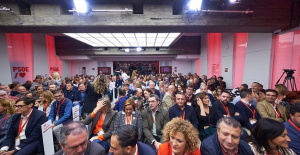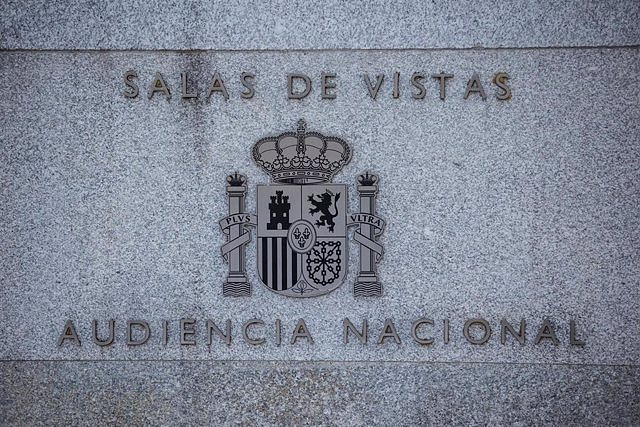Criticizes the retrospective bias of the reviews on appraisals and accredited by experts from the Bank of Spain
MADRID, 25 Ene. (EUROPA PRESS) -
The PricewaterhouseCoopers (PwC) auditor José María Sanz Olmeda, who coordinated the audits of Banco Popular's annual accounts between 2009 and 2015, defended this Wednesday before the judge of the National Court that he is investigating the alleged accounting irregularities committed in 2016 in the entity the veracity of the calculations.
Legal sources have explained to Europa Press that in his statement before magistrate José Luis Calama, which has lasted more than four hours, Sanz Olmeda has assumed and defended the work carried out by PwC both in accounting matters and in the procedure followed to carry out out the bank appraisals.
In this context, the auditor would have criticized the retrospective bias of the reviews on appraisals and accredited by the experts of the Bank of Spain. According to Sanz Olmeda, the review of the quality of the assets carried out by the ECB in 2014 with the collaboration of Deloitte already took into account the borrowers that were later examined in the inspection.
The person in charge of PwC has also argued before the head of the Central Court of Instruction Number 4 that there was no retrospective application of Circular 4/2016, for which reason the Board of Banco Popular would have entered the calculations correctly.
Sanz Olmeda, according to the aforementioned sources, would have explained that his interlocutor was normally the controller and that he never had meetings with the Board of Directors or with the then president of Popular, Ángel Ron. The only meeting they had, he added, was before the Supreme Court issued a sentence referring to the floor clauses.
In relation to appraisals, the auditor has indicated that PwC used common criteria similar to those it followed with other of its clients. Thus, he has indicated that it was the appraisers that were in charge of these procedures through independent technical experts, that the bank or the auditor did not intervene and that they did not detect deficiencies in the entity's appraisals.
Finally, Sanz Olmeda has maintained that at no time were there any requirements from PwC or from the supervisors that Banco Popular did not comply with.
Sanz Olmeda's statement comes after the judge accepted the request of various private accusations and, with the approval of the Prosecutor's Office, agreed to call him to court. In an order, the magistrate explained that "the arduous and complex investigation carried out" has gradually outlined some facts that provisionally allow us to affirm that "the 2015 annual accounts of Banco Popular concealed a deficit in provisions generated by conscious non-compliance with the accounting standards contained in annex IX of Bank of Spain Circular 4/2004".
Thus, the magistrate recalled in that order that PwC was the audit firm of Banco Popular during the years 2015 and before and that José María Sanz Olmeda was the head of the audit in the planning and execution of the audit work in said financial entity from 2009 to 2015.
"From what has been learned so far, it can be affirmed that the PwC auditors did not detect the significant shortfalls in provisions caused by an abnormal credit classification -from the point of view of risk- and by an accounting management of the foreclosed assets, which, to a large extent , deviated from compliance with the aforementioned annex IX of Circular 4/2004", Calama pointed out at the time.
It should be remembered that Judge Calama recently requested a new expansion of the report from the Bank of Spain experts Teodoro Fernández and Álvaro López after a series of doubts arose in their statement in court. Legal sources have indicated that the magistrate is still waiting to receive this document.
These movements are part of the case in which the magistrate is investigating two phases of the Popular's resolution process: the alleged accounting irregularities of the entity in 2016, with the capital increase, and the leaks to the press a year later that would have caused its resolution in mid-2017.

 Exploring Cardano: Inner Workings and Advantages of this Cryptocurrency
Exploring Cardano: Inner Workings and Advantages of this Cryptocurrency Seville.- Economy.- Innova.- STSA inaugurates its new painting and sealing hangar in San Pablo, for 18 million
Seville.- Economy.- Innova.- STSA inaugurates its new painting and sealing hangar in San Pablo, for 18 million Innova.- More than 300 volunteers join the Andalucía Compromiso Digital network in one month to facilitate access to ICT
Innova.- More than 300 volunteers join the Andalucía Compromiso Digital network in one month to facilitate access to ICT Innova.-AMP.- Ayesa acquires 51% of Sadiel, which will create new technological engineering products and expand markets
Innova.-AMP.- Ayesa acquires 51% of Sadiel, which will create new technological engineering products and expand markets The PSOE is holding a Federal Committee this Saturday that will serve to close ranks with Sánchez so that he does not resign
The PSOE is holding a Federal Committee this Saturday that will serve to close ranks with Sánchez so that he does not resign The Ibex 35 closes the week at its highest since 2015 and is already looking at 11,200
The Ibex 35 closes the week at its highest since 2015 and is already looking at 11,200 RELEASE: Dogfy Diet leads in canine nutrition with revolutionary natural solutions
RELEASE: Dogfy Diet leads in canine nutrition with revolutionary natural solutions STATEMENT: Fernando Belasteguín Curarti ambassador in China
STATEMENT: Fernando Belasteguín Curarti ambassador in China How Blockchain in being used to shape the future
How Blockchain in being used to shape the future Not just BTC and ETH: Here Are Some More Interesting Coins Worth Focusing on
Not just BTC and ETH: Here Are Some More Interesting Coins Worth Focusing on UPV students build a prototype of a wooden house to move to Equatorial Guinea
UPV students build a prototype of a wooden house to move to Equatorial Guinea The UA opens the call for the Impulso 2024 Awards for the best innovative business initiatives
The UA opens the call for the Impulso 2024 Awards for the best innovative business initiatives ALI, virtual assistant from Alicante, internationally recognized by the OECD
ALI, virtual assistant from Alicante, internationally recognized by the OECD Retrópolis brings the golden age of video games and computing to the UPV
Retrópolis brings the golden age of video games and computing to the UPV A million people demonstrate in France against Macron's pension reform
A million people demonstrate in France against Macron's pension reform Russia launches several missiles against "critical infrastructure" in the city of Zaporizhia
Russia launches several missiles against "critical infrastructure" in the city of Zaporizhia A "procession" remembers the dead of the Calabria shipwreck as bodies continue to wash up on the shore
A "procession" remembers the dead of the Calabria shipwreck as bodies continue to wash up on the shore Prison sentences handed down for three prominent Hong Kong pro-democracy activists
Prison sentences handed down for three prominent Hong Kong pro-democracy activists ETH continues to leave trading platforms, Ethereum balance on exchanges lowest in 3 years
ETH continues to leave trading platforms, Ethereum balance on exchanges lowest in 3 years Investors invest $450 million in Consensys, Ethereum incubator now valued at $7 billion
Investors invest $450 million in Consensys, Ethereum incubator now valued at $7 billion Alchemy Integrates Ethereum L2 Product Starknet to Enhance Web3 Scalability at a Price 100x Lower Than L1 Fees
Alchemy Integrates Ethereum L2 Product Starknet to Enhance Web3 Scalability at a Price 100x Lower Than L1 Fees Mining Report: Bitcoin's Electricity Consumption Declines by 25% in Q1 2022
Mining Report: Bitcoin's Electricity Consumption Declines by 25% in Q1 2022 Oil-to-Bitcoin Mining Firm Crusoe Energy Systems Raised $505 Million
Oil-to-Bitcoin Mining Firm Crusoe Energy Systems Raised $505 Million Microbt reveals the latest Bitcoin mining rigs -- Machines produce up to 126 TH/s with custom 5nm chip design
Microbt reveals the latest Bitcoin mining rigs -- Machines produce up to 126 TH/s with custom 5nm chip design Bitcoin's Mining Difficulty Hits a Lifetime High, With More Than 90% of BTC Supply Issued
Bitcoin's Mining Difficulty Hits a Lifetime High, With More Than 90% of BTC Supply Issued The Biggest Movers are Near, EOS, and RUNE during Friday's Selloff
The Biggest Movers are Near, EOS, and RUNE during Friday's Selloff Global Markets Spooked by a Hawkish Fed and Covid, Stocks and Crypto Gain After Musk Buys Twitter
Global Markets Spooked by a Hawkish Fed and Covid, Stocks and Crypto Gain After Musk Buys Twitter Bitso to offset carbon emissions from the Trading Platform's ERC20, ETH, and BTC Transactions
Bitso to offset carbon emissions from the Trading Platform's ERC20, ETH, and BTC Transactions Draftkings Announces 2022 College Hoops NFT Selection for March Madness
Draftkings Announces 2022 College Hoops NFT Selection for March Madness























